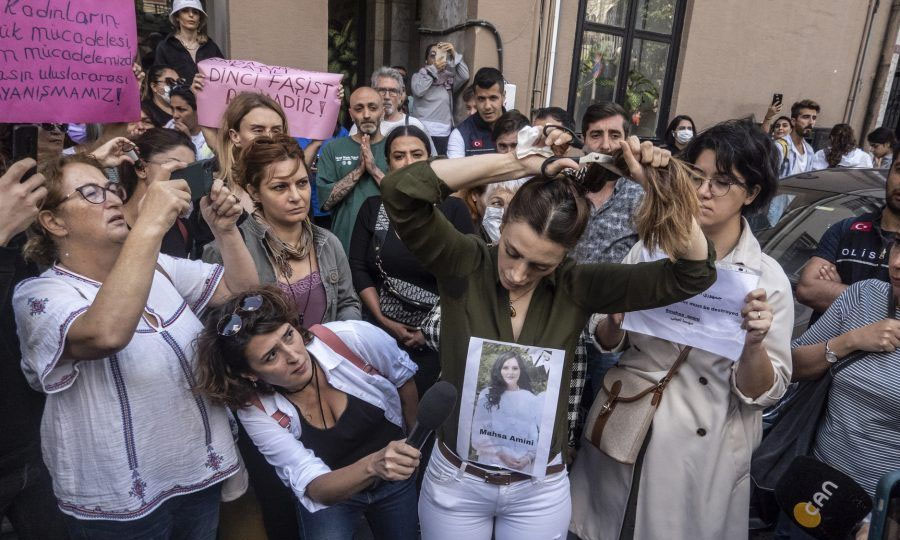
by Andreas Kokkinos
Riots erupted during the funeral of 22-year-old Mahsa Amini in Iran. Amini died under dubious circumstances last Friday after being arrested by the country's morality police. Eyewitnesses said she was beaten in a police van in Tehran, but police deny the claims. Men and women in various Iranian cities are burning hijabs in a symbolic and meaningful gesture calling for a change to the status quo in Iran's Islamic Republic.
We should not underestimate the power of people who are oppressed," she added. In conclusion, it is of paramount importance to highlight the "voices" of the general population
We tried to outline the consequences of the phenomenon with Dr. Christina Kaili, a sociologist at the Mediterranean Institute of Gender Studies (MIGS). Dr. Kaili believes it takes great courage for such a large part of the population to rise up, especially in a highly repressive regime such as this.
Of pivotal importance, in fact, is the power of the internet and social networks and media, since a number of women's associations and organizations in Iran are appealing to activists outside the country 'become their voice', effectively communicating to the outside world the events happening within the narrow borders of Iran. But how easy is this to do when internet connectivity is absent? Al Jazeera, citing internet watchdog NetBlocks, reports that there have been internet outages across the country and one of the major mobile phone providers has gone offline, leaving millions of Iranians disconnected.
La revolución de las mujeres en Irán. Miles se quitan el hijab obligatorio, tras la muerte de Mahsa Amini, de tan solo 22 años, que fue asesinada por la policía de la moral iraní por llevarlo mal puesto. Hay protestas en varias partes del país. Histórico. pic.twitter.com/NqI397nUHj
— Agustín Antonetti (@agusantonetti) September 17, 2022
"I can't predict where these protests will go or what the outcome of these protests will be, but we certainly have to analyze them and in the context of the already escalating tensions between Iran (Iran's nuclear program), the US, China, and Russia. Looking at other movements in countries such as Lebanon, Tunisia during the revolutions of 2011, and the subsequent waves of resistance that followed, women are writing a new chapter in their history" said Dr. Christina Kaili, underlining that large and radical social changes take time, especially in repressive regimes. The death of 22-year-old Mahsa Amini sparked the fuse of the bloody uprising, but the explosive mixture was already there. Networks of activists and researchers from, for example, Iran, Palestine, and Lebanon have been consulting since the Black Lives Matter period on steps of transnational solidarity. Having experienced the pandemic, Iran's tensions on the world stage, the consequences of the war in Ukraine, the energy crisis, poverty and restrictions, the world cannot bear any more pressure. "The question is how to convert this momentum into social change," she stressed.

Asked about the large presence of men in the protests - as is evident from the photographic and video footage reaching our ears - she considers the move very courageous, with the younger generation expecting a big change, saying that the death of this woman became a banner for the uprising. It takes many political and social forces for a revolution against an authoritarian regime to develop into social and political rights. "The well-being of women is the well-being for all," she said, reminding us that in the vast majority of cases where women do not thrive, neither do the rights of minorities or vulnerable groups on the basis of gender, race, religion, disability, sexual orientation, etc. The death of the activist and so many others who have lost their lives these days brings to the surface the ways in which solidarity is expressed by claiming public speech and space for silenced voices. At great courage and personal cost to end discrimination."

Dr. Kaili sees a huge opportunity, not only for women's rights but for society at large, in the uprising that is taking place. An uprising that may not exclude the possibility of triggering a domino effect of reactions in a larger context, being at a time when, due to pandemic, poverty and social exclusion or marginalization, inequalities have deepened. "We should not underestimate the power of people who are oppressed," she added. In conclusion, it is of paramount importance to highlight the "voices" of the general population, i.e. those on the streets of Iran, and to support movements and transnational organizations supporting them. Dr. Christina Kaili brings as an example of solidarity the highlighting of the issue through the Instagram page "Women of Cyprus" and other collectives in Cyprus. Women from Iran and people who are persecuted on the basis of gender, sexuality, religion, or disability discrimination are entitled to international protection.
[This article was translated from its Greek original]































